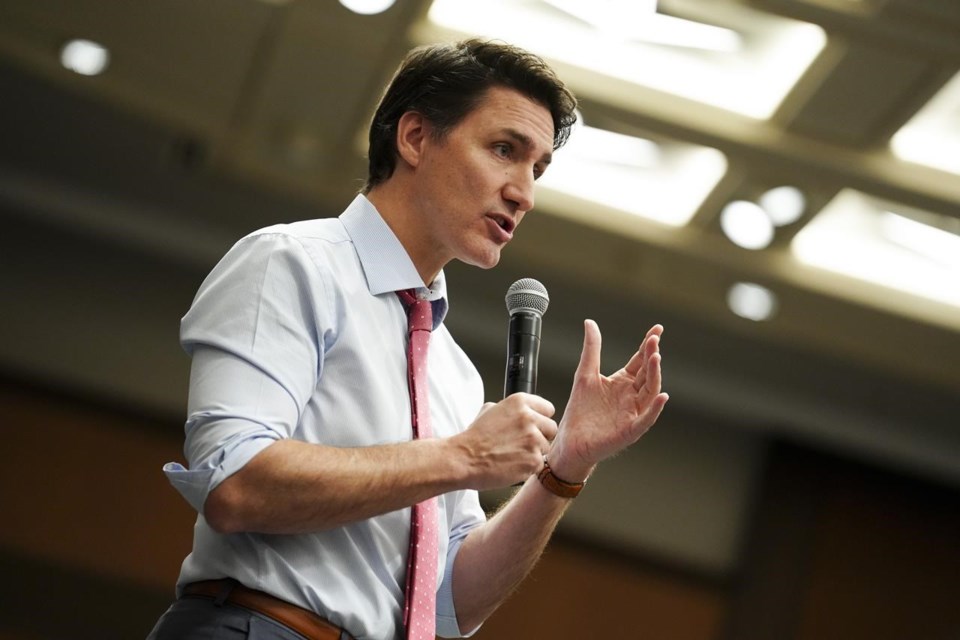OTTAWA ŌĆö ┬ĀThe federal Conservatives are siding with "multi-millionaires" and standing against "fairness" by refusing to support the federal budget, Prime Minister Justin Trudeau said Wednesday.┬Ā
Trudeau used his weekly caucus meeting to sing the praises of the Liberal government's latest spending plan, which aims to make corporations and the wealthy pay more in order to help finance billions in new spending on housing, student aid and job creation.
The budget presented Tuesday includes $53 billion in new spending over the next five years, with additional revenues of $25 billion from higher growth and $19 billion from adjusted capital gains taxes.
The government is also running deficits to help finance the spending, including a $39.8-billion deficit projected for this year.
Conservative Leader Pierre Poilievre accused Trudeau of an "orgy of spending" that wealthy taxpayers will be able to avoid financing by hiding their money overseas.
"sa╣·╝╩┤½├Į has become an unfair country where young people, an entire generation, cannot afford a home and families cannot afford food," Poilievre said in question period.┬Ā
It isn't right that multi-millionaires are asked to pay less tax on capital gains than a teacher or electrician pays on their income, Trudeau told caucus members.┬Ā
The tax changes won't impact 99.87 per cent of Canadian taxpayers, he added, and will not apply to the sale of anyone's primary residence.
Trudeau did not mention the New Democrats or Leader Jagmeet Singh, who has been coy about voting for the budget despite his party's supply-and-confidence agreement with the Liberals.
The budget includes funding for several NDP priorities, including the first phase of national pharmacare and federal standards for long-term care.
Bloc Qu├®b├®cois Leader Yves-Fran├¦ois Blanchet also said his caucus would not support the budget, which means the fate of the minority Liberal government hinges on NDP support.┬Ā
Singh has said he wants to talk to Trudeau about what is missing from the budget, including any windfall taxes on excess profits for corporations.
He also said he believes the Conservatives would cancel important programs if they form government, including national child care and pharmacare.
Conservative housing critic Scott Aitchison said he doubts the Liberal plan will ever come to fruition, because past promises of a housing overhaul have not been honoured.┬Ā
"In 2017, Justin Trudeau stood in front of a large building project with lots of hard-working Canadians behind him and promised a life-changing transformational national housing strategy," Aitchison said.
"And we see the transformation: house prices have doubled, rent has doubled, mortgage rates have doubled and people can't afford to put food on their table and pay the rent."
Aitchison said the solution for housing is that government should get out of the way.
But Trudeau said the Conservatives are the ones trying to stop progress and siding with the rich.
"They're voting against fairness," he said.┬Ā
"They will be voting against asking the ultra-rich to pay their share. Canadians need responsible leadership right now ŌĆö leaders who come to them with solutions ready to invest in Canadians' ideas."
The budget increased spending to more than $530 billion for 2024-25, with more than $11 billion in new spending largely focused on housing, student aid and grants, along with pharmacare and a long-promised disability benefit.
That benefit, at $200 a month, falls well shy of what advocates wanted to see.
The budget is in some ways a Hail Mary effort from the government to appeal to disillusioned millennials and gen-Z voters ŌĆö former Liberal supporters hit hard by the affordability crisis.
Trudeau and Finance Minister Chrystia Freeland are billing the budget as a fairness plan for younger Canadians.
The people being asked to pay more are among the ones "who've benefited from an economy that seems tipped towards them and away from everyone else, particularly young people," said Trudeau.
"So we're asking them to pay their fair share so that younger generations can have the same opportunities that Xers, boomers and other generations had when they were starting out in their lives."
The capital gains tax change increases the portion of capital gains that is taxed from 50 per cent to 66 per cent.┬Ā
The change will apply to all corporations and trusts, along with individuals whose capital gains exceed $250,000 in a year.
This report by The Canadian Press was first published April 17, 2024.
Mia Rabson, The Canadian Press



